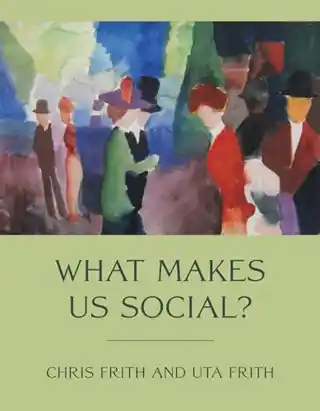A deep dive into the social mind-brain, examining the processes we share with other social animals and illuminating those that are uniquely human.
What Makes Us Social? is a scholarly but accessible exploration of the underlying processes that make humans the most social species on the planet. Chris and Uta Frith, pioneers in the field of cognitive neuroscience, review the many forms of social behavior that we humans share with other animals and examine the special form that only humans possess, including its dark side. These uniquely human abilities allow us to reflect on our behavior and share these reflections with other people, which in turn enables us to reason why we do things and to exert some control over our automatic behaviors. As a result, we can learn cooperatively with others and create and value cultural artifacts that survive through the generations.
Going beyond how we come to know ourselves and understand the minds of others, Frith and Frith investigate how we adapt mutually to make social interactions work. This book stands out in its application of a computational framework—one that lies at the intersection of psychology and artificial intelligence—to key concepts of social cognition, such as empathy, trust, group identity, and reputation management. Ultimately, What Makes Us Social? is a profound examination of the ways we communicate, cooperate, share, and compete with other humans and how these capabilities define us as a species.
Conditions of Use
![]() This book is licensed under a Creative Commons License (CC BY-NC-SA). You can download the ebook What Makes Us Social? for free.
This book is licensed under a Creative Commons License (CC BY-NC-SA). You can download the ebook What Makes Us Social? for free.
- Title
- What Makes Us Social?
- Publisher
- The MIT Press
- Author(s)
- Chris Frith, Uta Frith
- Published
- 2023-09-28
- Edition
- 1
- Format
- eBook (pdf, epub, mobi)
- Pages
- 432
- Language
- English
- ISBN-10
- 0262546272
- ISBN-13
- 9780262375498
- License
- CC BY-NC-SA
- Book Homepage
- Free eBook, Errata, Code, Solutions, etc.
1: What Is Social Cognition? 2: Learning from Others 3: Mirrors in the Brain 4: Sharing Emotions 5: The We-Mode 6: Joint Action 7: Predicting Behavior 8: Us and Them 9: Reputation and Trust 10: Mentalizing: The Competitive Heart of Social Cognition 11: The Dark Side 12: Modeling the Social World: The Computational Approach 13: Signals from the Deep 14: Consciousness and Control 15: Making Decisions in Groups 16: Communicating and Sharing Meaning 17: The Power of Teaching 18: Culture and the Brain 19: Getting Along Together 20: Facing a Pandemic Can Bring Out the Good in Us








